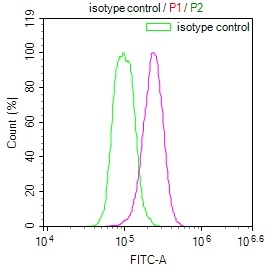CLDN14 Antibody
-
中文名稱(chēng):CLDN14兔多克隆抗體
-
貨號(hào):CSB-PA669859
-
規(guī)格:¥1100
-
圖片:
-
其他:
產(chǎn)品詳情
-
Uniprot No.:
-
基因名:CLDN14
-
別名:CLDN14; UNQ777/PRO1571; Claudin-14
-
宿主:Rabbit
-
反應(yīng)種屬:Human,Mouse
-
免疫原:Synthetic peptide of Human CLDN14
-
免疫原種屬:Homo sapiens (Human)
-
標(biāo)記方式:Non-conjugated
-
抗體亞型:IgG
-
純化方式:Antigen affinity purification
-
濃度:It differs from different batches. Please contact us to confirm it.
-
保存緩沖液:-20°C, pH7.4 PBS, 0.05% NaN3, 40% Glycerol
-
產(chǎn)品提供形式:Liquid
-
應(yīng)用范圍:ELISA,WB
-
推薦稀釋比:
Application Recommended Dilution ELISA 1:1000-1:10000 WB 1:200-1:1000 -
Protocols:
-
儲(chǔ)存條件:Upon receipt, store at -20°C or -80°C. Avoid repeated freeze.
-
貨期:Basically, we can dispatch the products out in 1-3 working days after receiving your orders. Delivery time maybe differs from different purchasing way or location, please kindly consult your local distributors for specific delivery time.
-
用途:For Research Use Only. Not for use in diagnostic or therapeutic procedures.
相關(guān)產(chǎn)品
靶點(diǎn)詳情
-
功能:Plays a major role in tight junction-specific obliteration of the intercellular space, through calcium-independent cell-adhesion activity.
-
基因功能參考文獻(xiàn):
- This study suggested considerable genetic heterogeneity in the causation of hearing loss in Dhadkai. Recessive mutations were observed in at least three genes causing hearing loss: OTOF (p.R708X), SLC26A4 (p.Y556X) and CLDN14 (p.V85D). Mutation p.R708X appeared to be the major cause of hearing impairment in Dhadkai. PMID: 29434063
- CLDN14 might not be a major causative gene for NSHL in Chinese populations, which would contribute to fully understanding the genetic cause of NSHL in the East Asian populations PMID: 29447821
- Our data suggest that children with the INSM1 binding site within the CLDN14 risk haplotype have a higher likelihood of hypercalciuria and kidney stones. Enhanced CLDN14 expression may play a role in the pathophysiology of their hypercalciuria. PMID: 28229505
- All hearing impaired individuals, including the proband, are homozygous for a pathogenic variant of CLDN14, but this only explains the deafness. PMID: 27629923
- Extensive clinical recruitment and targeted screening suggest that CLDN14 p.(Ala163Val) represents a major founder variant for prelingual sensorineural hearing loss in the Newfoundland population. PMID: 27838790
- CLDN14 is a novel direct target of EZH2-mediated H3K27ME3 and plays role in EZH2-H3K27ME3-mediated hepatocellular carcinoma aggressiveness. PMID: 27207647
- The rs170183 was correlated with a decline in claudin 14 expression in both lymphoblastoid cell lines and T cells. PMID: 26842849
- Rs1801725 (Ala986-Ser), rs1042636 (Arg990Gly) of CaSR gene and rs219778, rs219780 (Thr229Thr) of CLDN14 gene were significantly associated with kidney stone disease in patients from the Eastern part of India. PMID: 26107257
- Claudin 14 expression was up-regulated in gastric cancer. PMID: 24325792
- Data suggest a possible role for Claudin14 in urinary calcium excretion. PMID: 23991001
- CLDN14 mutations can contribute to the aetiology of childhood/congenital deafness in Moroccan patients. PMID: 23590985
- Human Cldn-8 and -14 were shown to convey Clostridium perfringens enterotoxin-mediated cytotoxicity at pathophysiologically relevant concentrations of this toxin, although ~2-to-10-fold less efficiently than Cldn-4. PMID: 23322640
- OPRM1 genetic polymorphisms are associated with the plasma concentration of cotinine in a Taiwanese MMT cohort. Carriers with the major allele of SNP rs1799971 had a higher plasma cotinine concentration. PMID: 23235333
- The hearing loss due to novel CLDN14 mutations is prelingual, severe-to-profound with greater loss in the high frequencies. PMID: 22246673
- The CLDN14 promoter is activated by Trichostatin A (TSA) treatment according to promoter reporter assays in HEK 293 cells. PMID: 20494980
- Individuals with mutations of CLDN14 may have different degrees of hearing loss and the loss is greater at higher frequencies. PMID: 20811388
- The palmitoylation of claudin-14 is required for efficient localization into tight junctions but not stability or strand assembly. PMID: 15769849
- The ability of CLDN14 to be recruited to these junctions is crucial for the hearing process. PMID: 15880785
- Common, synonymous variants in the CLDN14 gene that associate with kidney stones, were discovered. PMID: 19561606
顯示更多
收起更多
-
相關(guān)疾病:Deafness, autosomal recessive, 29 (DFNB29)
-
亞細(xì)胞定位:Cell junction, tight junction. Cell membrane; Multi-pass membrane protein.
-
蛋白家族:Claudin family
-
組織特異性:Liver, kidney. Also found in ear.
-
數(shù)據(jù)庫(kù)鏈接:
Most popular with customers
-
-
YWHAB Recombinant Monoclonal Antibody
Applications: ELISA, WB, IHC, IF, FC
Species Reactivity: Human, Mouse, Rat
-
Phospho-YAP1 (S127) Recombinant Monoclonal Antibody
Applications: ELISA, WB, IHC
Species Reactivity: Human
-
-
-
-
-




















